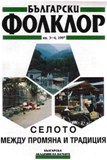Реприватизация без селяни. За устойчивостта на една пагубна българска традиция
Reprivatization without Peasants. On the Persistence of a Disastrous Bulgarian Tradition
Author(s): Dobrinka Kostova, Christian GiordanoSubject(s): Anthropology
Published by: Институт за етнология и фолклористика с Етнографски музей при БАН
Summary/Abstract: This paper describes the legal and economic changes in Bulgarian agriculture during the period of “transition” beginning in 1990. It examines the transformation of the social structures and roles and shows that the land reprivatization was implemented not with peasants but with tenants (arendatori). The goal of the agrarian reform, however, had been to reestablish the pre-socialist status quo by returning the land to its owners of 1946. An important economic and social problem in the process of the restitution of land ownership was the fact that the majority of the owners, despite their desire to get their land back, did not intend to till the soil themselves. As a consequence, the contradiction between the desire for ownership and the lacking motivation to become a farmer led to significant problems in the process of creating economically powerful farmers. It led to a change in the personal interest of the landowners, from land cultivation to profiting from land ownership by leasing the land to tenants or to cooperatives. Hence, a group of large scale tenant farmers emerged who rent and cultivate large plots of land. They usually belong to the previously socialist local rural elite which is undergoing a dynamic transformation of positions and values: from socialist collectivism they have now eagerly turned to a rugged individualism. However, while the tenants hold a strong position over the landowners, they are in a powerless position vis-à-vis those economic groups from the big cities who control the input and output of agriculture. The people with the Mercedes and the cellular phone, the sharks (akuli), are the real managers of agriculture today, and the development of Bulgarian agriculture largely depends on their vested interests.
Journal: Български фолклор
- Issue Year: XXIII/1997
- Issue No: 3-4
- Page Range: 130-143
- Page Count: 14
- Language: Bulgarian
- Content File-PDF

